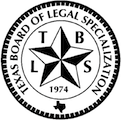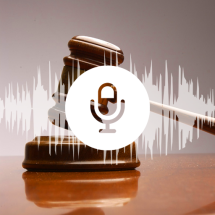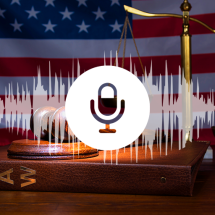TEXAS APPELLATE ATTORNEY – Appealing Criminal Cases in Texas
An individual in Texas convicted of a crime has 30 days in State Court and 10 days in Federal Court to file a notice of appeal. If you wish to appeal a conviction after a trial, you should contact an Attorney immediately because time is of the essence.
What is a Criminal Appeal?
In America, we take pride in always giving individuals their opportunity to defend against an accusation, and under the Due Process Clause of the Constitution, people generally are always afforded their day in Court. We do not, however, get our day in court over and over again until we get the outcome we desire. A common misconception about an appeal is that it is a do-over of the entire trial process. An appeal can generally be analogized more of an “instant replay” than it is a re-trial. A criminal appeal is a review of the trial court’s findings to determine whether the rulings were fair and appropriate. Article 44.02 of the Texas Code of Criminal Procedure provides for a criminal defendant in Texas the opportunity to appeal a conviction. Generally, the appellate courts only review the actions made by the trial judge. This basically means the appellate court reviews rulings made either before or during a trial to determine if they were correct. An appeal in Texas, as it is in Federal Court, is used primarily to argue points of law, and consequently to argue the law was not applied correctly in a given circumstance. If done effectively by a good criminal defense attorney, it is possible to have a conviction reversed.
It is critical that a criminal defendant timely preserve issues for appeal at the trial court level and properly present them to the appellate court. Failure to do so will result in automatic denial of relief on those issues under the rules of appellate procedure. This is why it is extremely vital to hire an experienced and effective Attorney for your trial. Even if a ruling is contrary to what is good law, a lawyer should timely object to preserve the error for an appeal. If it is not properly objected to and preserved in the appellate record, the issue is considered waived. Successful appeals can result in either a new trial or an acquittal.
What Types of “Errors” Result in Reversals?
Simply because there was an error made by the trial court does not automatically entitle a defendant to a reversal or a new trial. As a general rule, the more fundamental or serious the error, the more likely it is to result in a reversal. The seriousness is often measured by how directly it affects a right under the U.S. Constitution. Good examples can be violations of the confrontation clause or a substantial defect in the jury charge. Many errors if not most errors are classified as “harmless.” This means that even though there was a mistake made at trial, the appellate courts may rationalize the conviction by claiming the error was not a big deal.
Additionally, when a mistake is made at trial, the defendant’s lawyer is usually required to make an appropriate objection. This is known as “preserving error”. The appellate courts, however, can easily duck difficult legal questions where an error was not preserved by counsel at the trial level.
Who Decides Appeals?
In Texas, there are two layers of appeals after a trial. There are 14 appeals districts which are the first line appeals courts. These courts handle criminal and civil appeals. There is the Texas Court of Criminal Appeals which is the highest criminal court in the State above the two courts. (Civil appeals ultimately go to the Texas Supreme Court).
The below are the fourteen districts of the Texas Courts of Appeals:
- First Court of Appeals of Texas- Houston (formerly Galveston), covering Austin, Brazoria, Chambers, Colorado, Fort Bend, Galveston, Grimes, Harris, Waller, and Washington counties;
- Second Court of Appeals of Texas – Fort Worth, covering Archer, Clay, Cooke, Denton, Hood, Jack, Montague, Parker, Tarrant, Wichita, Wise, and Young counties;
- Third Court of Appeals of Texas – Austin, covering Bastrop, Bell, Blanco, Burnet, Caldwell, Coke, Comal, Concho, Fayette, Hays, Irion, Lampasas, Lee, Llano, McCulloch, Milam, Mills, Runnels, San Saba, Schleicher, Sterling, Tom Green, Travis, and Williamson counties;
- Fourth Court of Appeals of Texas – San Antonio, covering Atascosa, Bandera, Bexar, Brooks, Dimmit, Duval, Edwards, Frio, Gillespie, Guadalupe, Jim Hogg, Jim Wells, Karnes, Kendall, Kerr, Kimble, Kinney, La Salle, Mason, Maverick, McMullen, Medina, Menard, Real, Starr, Sutton, Uvalde, Val Verde, Webb, Wilson, Zapata, and Zavala counties;
- Fifth Court of Appeals of Texas – Dallas, covering Collin, Dallas, Grayson, Hunt, Kaufman, and Rockwall counties;
- Sixth Court of Appeals of Texas – Texarkana, covering Bowie, Camp, Cass, Delta, Fannin, Franklin, Gregg, Harrison, Hopkins, Hunt, Lamar, Marion, Morris, Panola, Red River, Rusk, Titus, Upshur, and Wood counties;
- Seventh Court of Appeals of Texas – Amarillo, covering Armstrong, Bailey, Briscoe, Carson, Castro, Childress, Cochran, Collingsworth, Cottle, Crosby, Dallam, Deaf Smith, Dickens, Donley, Floyd, Foard, Garza, Gray, Hale, Hall, Hansford, Hardeman, Hartley, Hemphill, Hockley, Hutchinson, Kent, King, Lamb, Lipscomb, Lubbock, Lynn, Moore, Motley, Ochiltree, Oldham, Parmer, Potter, Randall, Roberts, Sherman, Swisher, Terry, Wheeler, Wilbarger, and Yoakum counties;
- Eighth Court of Appeals of Texas – El Paso, covering Andrews, Brewster, Crane, Crockett, Culberson, El Paso, Hudspeth, Jeff Davis, Loving, Pecos, Presidio, Reagan, Reeves, Terrell, Upton, Ward, and Winkler counties;
- Ninth Court of Appeals of Texas – Beaumont, covering Hardin, Jasper, Jefferson, Liberty, Montgomery, Newton, Orange, Polk, San Jacinto, and Tyler counties;
- Tenth Court of Appeals of Texas – Waco, covering Bosque, Brazos, Burleson, Coryell, Ellis, Falls, Freestone, Hamilton, Hill, Johnson, Leon, Limestone, Madison, McLennan, Navarro, Robertson, Somervell, and Walker counties;
- Eleventh Court of Appeals of Texas – Eastland, covering Baylor, Borden, Brown, Callahan, Coleman, Comanche, Dawson, Eastland, Ector, Erath, Fisher, Gaines, Glasscock, Haskell, Howard, Jones, Knox, Martin, Midland, Mitchell, Nolan, Palo Pinto, Scurry, Shackelford, Stephens, Stonewall, Taylor, and Throckmorton counties;
- Twelfth Court of Appeals of Texas – Tyler, covering Anderson, Angelina, Cherokee, Gregg, Henderson, Houston, Nacogdoches, Rains, Rusk, Sabine, San Augustine, Shelby, Smith, Trinity, Upshur, Van Zandt, and Wood counties;
- Thirteenth Court of Appeals of Texas – Corpus Christi, covering Aransas, Bee, Calhoun, Cameron, De Witt, Goliad, Gonzales, Hidalgo, Jackson, Kenedy, Kleberg, Lavaca, Live Oak, Matagorda, Nueces, Refugio, San Patricio, Victoria, Wharton, and Willacy counties;
- Fourteenth Court of Appeals of Texas – Houston, covering Austin, Brazoria, Chambers, Colorado, Fort Bend, Galveston, Grimes, Harris, Waller, and Washington counties.
Court of Criminal Appeals
If a case is appealed from one of the 14 Courts of Appeals, it then would be heard by the Texas Court of Criminal Appeals. The Texas Court of Criminal Appeals is Texas’ highest court for criminal cases. The Court consists of a Presiding Judge and eight Judges. The judges are elected by voters from the entire state, and hold terms of six years.
Federal Appeals
Following a guilty verdict, a criminal defendant in federal court must file a notice of appeal pursuant to Rule 4(b) of the Federal Rules of Appellate Procedure within a strict 10 day time period. If this is not done, there are also several other post-verdict motions that could be explored. Contact Carl at 214.702.CARL (2275) and he can apprise you of all your legal options and whether you should consider filing a Federal appeal.
How Do You File an Appeal?
A criminal appeal is started by filing a notice of appeal following a conviction. This does not have to be anything substantial, usually, just a statement that you want to appeal, what you are appealing from, and which court of appeals will hear the appeal. The notice of Appeal is filed with the Clerk’s office for the court you were convicted in. They will then send the notice of appeal, along with other information about the case to the court of appeals. In Texas, the notice of appeal in a criminal case must be filed within 30 days of the date you are sentenced (unless a motion for a new trial was filed, in which case you must file a notice of a direct appeal within 90 days of conviction).
What Happens if I Missed the Appeal Deadline?
After the 30-day deadlines have expired, there are still some available remedies for appeal but those are far more limited. The most common are under Chapter 11.07 of the Texas Code of Criminal Procedure for felony offenses which deal with controverted, previously unresolved facts which are material to the legality of the applicant’s confinement. This may be because of newly discovered evidence because it is discovered the prosecution did not turn over exculpatory evidence to the defense, or ineffective assistance of counsel. The filing of an 11.07 writ can be extremely complicated and should be discussed directly with an attorney.
You Need an Appellate Lawyer if…
- You recently were convicted following a trial in Texas;
- Your current attorney is not comfortable writing an appeal in Texas (in state or federal court);
- You want to determine if your case can be appealed in Texas;
- You are going to trial, and want to make sure your case is focused on preserving error for a possible appeal;
- You want to file a writ of habeas corpus.





















